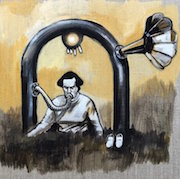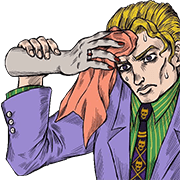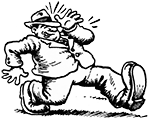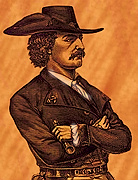|
Yeah that's Chaucer I think. The Prioress' Tale if I recall. And you're right it sits oddly, Stephen is a character who I think doesn't register Bloom as Jewish, or if he does he doesn't see why Bloom would react poorly. I think you could pore over that section again and again and look for a reason why Stephen launches into it but I don't think you'll be able to find anything concrete though. Perhaps he's just underscoring that Bloom isn't a symbolic father, and Stephen isn't his symbolic son, that they have a kind of distance that shows they're not actually that compatible.
|
|
|
|

|
| # ? May 3, 2024 07:24 |
|
Nearly done with the final episode now. Its quite a shift yet again, and reminds me so much of conversation with a couple of people that I am reading her voice with a Nova Scotian accent. (mind my friends don't talk so much about sex as is on Molly's mind--at least not around me!)
|
|
|
|
|
What a sweet note to end on. Thinking back to the first chapter, where the mother was lost, and absent, here the mother was fully loving righteously present in all of her glory. Loads more water imagery, huge backstory showing Molly thinks of herself as not fully a part of Irish society. Her attitude is aggressive, modern, liberated. Lusty, carnal, taking us on a tour of her history, sexual and other, and the disdain she sometimes (frequently?) holds for Leopold. How dare he ask for breakfast in bed, he probably had sex with someone last night. Yet at the end, she remembers him fondly and almost we see her melt into the memory. Wonderful poo poo, its done.
|
|
|
|
My 60 year old paperback worn but not defeated!
|
|
|
|
J_RBG posted:Yeah that's Chaucer I think. The Prioress' Tale if I recall. And you're right it sits oddly, Stephen is a character who I think doesn't register Bloom as Jewish, or if he does he doesn't see why Bloom would react poorly. I think you could pore over that section again and again and look for a reason why Stephen launches into it but I don't think you'll be able to find anything concrete though. Perhaps he's just underscoring that Bloom isn't a symbolic father, and Stephen isn't his symbolic son, that they have a kind of distance that shows they're not actually that compatible. That might go towards why Stephen didn't stay the night I guess, which also struck me oddly.
|
|
|
|
|
Bilirubin posted:My 60 year old paperback worn but not defeated! even when it all fades to dust, Joyce's shitposts will still be there, somehow, in the universe. £.s.d. i was wondering , now that you're done with the novel, do you get the impression that Joyce may have actually been genuinely a mad man? Just given the wide range of voices he has access to (the fact that he apparently actually had a great singing voice too is hilarious. Quite a mummer that one.) , and the fact that Ulysses seems to anticipate not an ultimate modernist reduction of something black on white , but an immense psychedelia that's link to meaning never resolves beyond the horizon of its seemingly daily "randomness". The paranoiac's boon. EDIT: Also, why do Pynchon and Joyce seem to get mentioned together? To me they are sort of completely different once you get beyond their shared fascination with statistics in daily life. Honestly, Pynchon and DFW share more similarities than Pynchon and Joyce, and iirc DFW claims he never read pynchon so riddle me that. almost there fucked around with this message at 20:21 on Oct 7, 2020 |
|
|
|
Mad? Hell no. Aggressively marching to his own tune? Absolutely. Earlier I asked whether he wrote the literary equivalent of a cold read. After finishing I can state that this was all intentional. WHY he felt so driven to do this to the literary form however, I have no idea. I'm mystified why someone would spend so much time doing this (and later, what he did in the Wake I have been mulling over the book since I finished, and doing a fair bit of external reading of analysis, which is something I also do with Pynchon a great deal. They both have grand concept novels and gently caress around with structure, but in retrospect I find that of the two books that took me 30 years to get through that Gravity's Rainbow is the more accessible. Perhaps because Pynchon has a more lighthearted take on the world (lol after the horrors of WWII)? Or that I am from a closer era? Or that he is so outrageously funny? Or that he is American and lacks the rigid classical education common to Europe that is so essential to Joyce? I do know I will be reading Ulysses again, but I need to read other things for now as kind of a mental warm down.
|
|
|
|
|
Also my guess for the man in the MacIntosh: author self insert
|
|
|
|
|
Bilirubin posted:Mad? Hell no. Aggressively marching to his own tune? Absolutely. its interesting you bring up form, because english literary Modernism really found itself in Ulysses. I don't think before Joyce there was ever a real willingness to to combine the comical with elements in literary realism. Joyce pioneers the comic novel in ulysses and its why i think he invites comparisons to Swifte, whose caricatural and carnivalesque depictions seem to invade and coexist alongside the real social worlds they lived in. With painting it maybe shares a sense of space, and a general cultural willingness to eschew representing some sort of baseline reality, but apart from that it lacks (imo) cubism's undergirding horror (the new forms discovered were terrifying). Or if it does share that, it definitely doesn't lay down and die there. The book, ultimately, is willing to play. The caveat being that it's only willing to play with the exquisite statues of history and society, which referents I think Joyce proves to be what exactly separates private language from literary language (the concrete). It needs it there as a sort of buoy to support its action, and without it stands only oblivion. All such action needs such supports. At least, that's my reading on the ideology of it. I believe Joyce was basically satirizing Hegel's ideal state by infusion of Swift, and I don't know how cubist that is. Those comparisons are helpful tho dont get me wrong, but literature has greatnesses due to its own merits of form as well. Bilirubin posted:I have been mulling over the book since I finished, and doing a fair bit of external reading of analysis, which is something I also do with Pynchon a great deal. They both have grand concept novels and gently caress around with structure, but in retrospect I find that of the two books that took me 30 years to get through that Gravity's Rainbow is the more accessible. Perhaps because Pynchon has a more lighthearted take on the world (lol after the horrors of WWII)? Or that I am from a closer era? Or that he is so outrageously funny? Or that he is American and lacks the rigid classical education common to Europe that is so essential to Joyce? i think the difference is in the form. Gravity's rainbow doesn't have nearly as much stunt pilotry going on as ulysses, and seems more or less only concerned with weaving its (brilliant) story ,with , admittedly , only some of the same narrational tricks one finds in Joyce.
|
|
|
almost there posted:i think the difference is in the form. Gravity's rainbow doesn't have nearly as much stunt pilotry going on as ulysses, and seems more or less only concerned with weaving its (brilliant) story ,with , admittedly , only some of the same narrational tricks one finds in Joyce. I suspect its also part of a difference in intent. Pynchon seems much more lighthearted and less burdened by what came before, and is interested in building up his vision of a thing. Joyce is still trying to escape the constraints of what came before ("History is the nightmare from which I’m trying to awake” as Stephen puts it). So in this respect I agree with J_RBG's earlier comment that you don't get Pynchon without Joyce. You needed a stubborn man to break snow ahead of your sled and free you to explore as you wished.
|
|
|
|
|
The more I think about it, the more I see this books brilliance.
|
|
|
|
|
I get it now. The last chapter isn't a coda; it's an aria. In the entire rest of the book you see the mass of humanity busy doing literally everything possible in a life. You go from a restaurant at midday that is so chaotic with life that it is overwhelming to the protagonist, to progressively less populated scenes to a penultimate chapter where the few folks in the after hours cafe diminish to two talking late into the night to the one who gradually falls to sleep. But in that final chapter, when no one else in the city is awake, you have a singular person, woken in that limnal hour, in that hypnogogic state between wakefulness and sleep, run through their singular life, with all it entails, all it's sorrows and joys, pain and achievement, frustrations and, um, fulfillments. Its the specific instance rising out above the great cloud of possibles. I think this is the best book I've read.
|
|
|
|
|
That's a great post. Think I'll refer to it from now on as Molly's aria, it's so fitting
|
|
|
|
almost there posted:EDIT: Also, why do Pynchon and Joyce seem to get mentioned together? To me they are sort of completely different once you get beyond their shared fascination with statistics in daily life. Not much of a scholar here anymore but I'd link Joyce and Pynchon in how their stories pitch the spontaneous individual against the momentum of history. Wallace does not really write with a historical sensibility like the other two. I'd say instead that he pitches the spontaneous individual against the momentum of science, sort of a constant disappointment with the future-as-it-arrives rather than the cryptic structures of the past. I don't buy that Wallace never read Gravity's Rainbow. Besides how Infinite Jest shares thematic fascinations toward medicalized/manipulated people and male-gaze cinema, I can't believe that the Brockengespenst shows up in both books (bearing so many other similarities) as anything but an homage. I have a foggy memory that Wallace may have eventually admitted to it, or someone who knew him said they knew he had read GR at least. On the other hand, thanks to "Madame Psychosis", we know for sure that he read Ulysses.
|
|
|
|
OK so what is the deal with the "Restored Finnegan's Wake" like here https://www.amazon.ca/Penguin-Classics-Restored-Finnegans-Wake/dp/0141192291 other than you can charge more for it. Like, would Joyce put that many errors into a book he worked on for 15 years?
|
|
|
|
|
http://jjda.ie/main/JJDA/JJDAhome.htm This is the place where you can see their working, in a way I'm in a reading group and we all hate them though, lol. Sometimes what they recommend is outright implausible. The thing is Finnegans Wake incorporates error into its system. Joyce did a lot of the book by dictating to friends and was relatively relaxed about their inevitable errors because they would fit the aesthetic of the book. This is no doubt an achievement and will make some improvements, but I'm not sure whether it's entirely healthy for Joyce scholars to obsess over a text where unintentional mistakes literally make sense
|
|
|
|
Bilirubin posted:OK so what is the deal with the "Restored Finnegan's Wake" like here https://www.amazon.ca/Penguin-Classics-Restored-Finnegans-Wake/dp/0141192291 other than you can charge more for it. afaik, yes
|
|
|
Lex Neville posted:afaik, yes I meant by accident not with intent
|
|
|
|
|
i know
|
|
|
|
Bilirubin posted:I meant by accident not with intent Mistakes are the portals of discovery. Also iirc didn't Joyce even rewrite parts of Ulysses to incorporate the printing errors or something of that nature? Fascinating that he decided to not symbolise the elements of supposed error when it came to the Wake. Typifies the difference between neurotic rationalization and psychotic drift for me. almost there fucked around with this message at 18:26 on Feb 23, 2021 |
|
|
|
Jrbg posted:That's a great post. Think I'll refer to it from now on as Molly's aria, it's so fitting I think there's a pretty strong case to be made as well that it isn't really Molly, it's Nora Barnacle. As Anthony Burgess pointed out, the daughter of a Sgt-Major with Molly's supposed background and education simply wouldn't talk like a Dublin fishwife. Plus the fact that Joyce openly cribbed the endless, unpunctuated streams of writing from Nora's letters. Another interesting wrinkle, given that Stephen is basically Joyce.
|
|
|
|
I mentioned already in the literature thread that I'm making my way through Ulysses after having read Dubliners and A Portrait of the Artist as a Young Man. I just finished the Cyclops chapter, which was great and had me laughing the whole way through. Also I think the Man in the Macintosh is James Duffy from A Painful Case. I know I'm hardly the first to believe so, but I did at least come to the conclusion on my own and had been thinking it was him for some time before reading the line referring to him in this chapter. I figured that the Man's role in the narrative seems to be like one of the Greek gods, moving about incognito among mortals who only sometimes notice their presence. They tend to do so while keeping an eye on those heroes whom they favor. Now of course Stephen Dedalus is an author self-insert character, but then he is the author As A Young Man. I think (and have read) that Bloom is supposed to be an older, wiser, calmer Joyce self-insert; I also think the relationship they have in the story dovetails nicely with Stephen's Shakespeare theory: that Hamlet and his father both represent Shakespeare himself and are projections of his real-life issues and concerns. Joyce, of course, garnered a lot of material from his own life and the lives of those around him. And Stanislaus Joyce as a bachelor was the inspiration for Mr. Duffy; additionally in real life he was evidently more or less his brother's patron, supporting him behind the scenes--much as the gods (Athena particularly, if I remember my Homer correctly) did for Odysseus. Which would make Duffy a logical choice for the role the Man in the Macintosh has played thus far, completely aside from the line about how he loves a dead woman. That last line just seems to seal things for me.
|
|
|
Meaty Ore posted:I mentioned already in the literature thread that I'm making my way through Ulysses after having read Dubliners and A Portrait of the Artist as a Young Man. I just finished the Cyclops chapter, which was great and had me laughing the whole way through. I like this theory
|
|
|
|
|
No Bloom don't, don't, please just just... The Oxen of the Sun is a relief so far in comparison.
|
|
|
|
Funny thing, despite being approximately three times as long by page count as the Oxen of the Sun, Circe took me approximately one third of the page to read by time count. End coffinmaker to the and at the recuse. Honestly, it went by incredibly fast. It's, what, roughly 180 pages in the Vintage edition? And I read it in about four hours over two days. The previous chapter took a little longer to read, maybe five or six hours, but done over a week or so. Hope I can finish the book by the end of Bloomsday. I think it would be fitting.
|
|
|
|
My reading in this book has temporarily stopped. Where? bigfullstop. Will continue reading momentarily yes the last fortyeight pages of the book upcoming try to get it done in one fell swoop this afternoon yes E: happy Bloomsday, everybody.
|
|
|
|
Oh man, that last chapter. Enjoy!
|
|
|
|
|
The final two chapters of ulysses are as good as books get. Have never owned an edition with the big full stop though, I want one By the way here's some ulysses numerology -The original publication was 732 pages = 366 x2 (1904, the year it was set, was a leap year, so 366 full days; ulysses is both day and night) -The book came out on 2/2/22 which was Joyce’s 40th birthday, possibly the best timed release of anything, ever. The first two lines have 22 words and map onto the metre of Homer’s poetry -In episode 3 Stephen Dedalus walks on the beach and thinks about 96 different people. There are 100 paragraphs there, just as the Divine Comedy has 100 cantos -Episode 14 has 68 long paragraphs, and is split up into three parts of 14+40+14 (7 & 10 are the divine numbers btw) -There are 18 episodes in all, with three parts of 3+12+3
|
|
|
|
Also another thing about numbers, apparently the final episode introduces 185 new characters. Which is amazing for what is really just a woman lying in bed. Ulysses is a book about the crowds in the streets but also the crowd in your head
|
|
|
|
Just got finished, and yeah, it's a lovely and fitting end. Not just to the book itself, but really to his other writings up to that point; as of course most of the characters out of Dubliners and A Portrait put in an appearance or had some some kind of role or mention in Ulysses. I enjoyed all the details linking the stories: discovering that one of the sisters from "The Dead" was Stephen's godmother (also of note, that the other sister did in fact die not long after the party as Mr. Conroy feared); Bloom having known and attended the funeral of Mrs. Sinico; the divergent fortunes of Lenehan and Corley; Molly dismissing Kathleen Kearney and other young singers of her ilk as "sparrowfarts"; the whole gang from "Grace" being part of a larger circle of friends including Bloom, Simon Dedalus, Patrick Dignam, and others; and so on.
Meaty Ore fucked around with this message at 03:39 on Jun 17, 2021 |
|
|
|
I’m thinking of doing a reread of Ulysses this summer. the edition I have is Penguin modern classics, the paperback with the picture of the tower on the cover, but I know many people favour Oxford’s world reader edition. What are the key differences between the two? Am I “missing out”, or is Penguin okay too ulvir fucked around with this message at 07:05 on Jun 17, 2021 |
|
|
|
The big thing about the penguin modern classics is that the divisions between episodes isn't super clear. But otherwise it does a lot for readability, it's relatively comfortable to hold and the typeface is large. My view is that if you're not a scholar and just interested in reading then go for whichever is the easiest for you personally to read. There's an alma classics version that has a load of good annotations at the back and is cheap but its typeface is really small, for example Also rip seamus deane Meaty Ore posted:Just got finished, and yeah, it's a lovely and fitting end. Not just to the book itself, but really to his other writings up to that point; as of course most of the characters out of Dubliners and A Portrait put in an appearance or had some some kind of role or mention in Ulysses. I enjoyed all the details linking the stories: discovering that one of the sisters from "The Dead" was Stephen's godmother (also of note, that the other sister did in fact die not long after the party as Mr. Conroy feared); Bloom having known and attended the funeral of Mrs. Sinico; the divergent fortunes of Lenehan and Corley; Molly dismissing Kathleen Kearney and other young singers of her ilk as "sparrowfarts"; the whole gang from "Grace" being part of a larger circle of friends including Bloom, Simon Dedalus, Patrick Dignam, and others; and so on. Yeah! I love that about it. Ulysses was originally conceived as a story for dubliners but span out of control Jrbg fucked around with this message at 09:01 on Jun 17, 2021 |
|
|
|
thanks. in that case I'll just read my current copy this time, and then go hunting for the oxford one whenever the next reread is due a few years down the line 
|
|
|
|
Bilirubin posted:Chapter two: Stephan at school with the kids and the scene with Mr. Deasy. A shocking amount of antisemitism from the later, along with comments these days heard only further north on the island. started my reread today, and this chapter surprised me too. I had completely forgotten this part
|
|
|
|
Celebrating Bloomsday this year- I’ve been enjoying Ulysses on my endless flight.
|
|
|
|

|
|
|
|
Starting to get the itch to reread Ulysses, although I'm already in a door stopper of a book so perhaps in a month or two
|
|
|
|
|

|
| # ? May 3, 2024 07:24 |
|
Alex Ross's "Wagnerism: Art and Politics in the Shadow of Music" devotes a healthy amount of time on Wagner's influence on Joyce. A door stopper about door stoppers, but it's very well written.
|
|
|

















